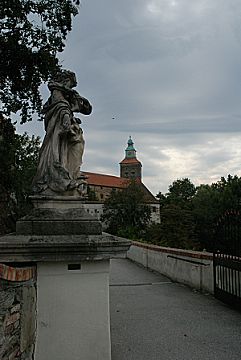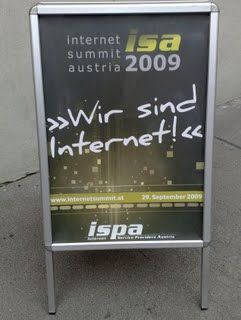Random thoughts
Tuesday, September 29, 2009
Internet Summit Austria 2009
Today I attended the Internet Summit Austria 2009 held by the Internet Service Providers Austria association at the Austrian Academy of Sciences. The motto of the event was “We are Internet”, referring to the fact that the Internet is created by people and used by people.
ISPA chairman Andreas Koman opened the session with statistics about Internet use in Austria and an overview of current developments and challenges.
Claudia Bandion-Ortner, minister of justice, admitted her preference for paper files and reminded the audience that the Internet is not an area unregulated by law. There are legal issues specific to information technology, such as data theft and violation of data privacy rights. While fraudsters and other criminals use the Internet, most crimes are media neutral. One area that is closely linked to the Internet, though, is child pornography. Bandion-Ortner referred to the controversial German pilot for blocking access to illegal sites. Needless to say, the same filter technology could be used for censoring access to legitimate information or enforcing intellectual property rights.
Volker Grassmuck delivered a keynote about the reformation of intellectual property law in the digital age. Established “common sense” can block creativity and innovation. Some ideas worked well although most people would have assumed they wouldn’t:
On net neutrality Grassmuck mentioned a speech by FCC chairman Julius Genachowski and a refined view on the issue, with net neutrality but with network management to handle congestion or spam and with provisions for law enforcement, and transparency which would allow blocking or throttling certain types of traffic as long as customers are made aware.
There is no one solution that satisfies the needs of content producers, consumers and intermediaries. Working models will require a combination of an agreement between creative professionals and society, markets, free licenses, public subsidies and a “cultural flat rate”.
One of the conference gifts was, ironically, a USB stick with a locked down installation of Firefox using the Tor network to ensure privacy.
The keynote was followed by a lively discussion about intellectual property rights, including but not limited to compensation for the creator of content. The composer Johanna Doderer and the author Gerhard Ruiss pointed out that they want to maintain control over what happens with their works and reminded the audience that creative professionals are typically paid by how often their works sell. Georg Hitzenberger of Play.fm and Bettina Kann of the Austrian National Library outlined some of the challenges with obtaining rights for use in digital media and making content available. For example, the digital Web archive maintained by the Austrian National Library has unreasonably strict access requirements in selected locations only, one person at a time. Franz Schmidbauer touched on legal aspects and the adequacy of intellectual property rights enforcement.
MEP Eva Lichtenberger made an interesting comment about giving young people the ability to purchase digital media without requiring a credit card, quoting the large amounts spent on ringtones where suitable payment solutions are offered by telecom providers.
After the lunch break, Peter A. Gloor gave an entertaining presentation about “Coolhunting by Swarm Creativity” (that’s a lot of buzzwords for a title), explaining how their system combines different inputs–the wisdom of the crowd in the form of the Web, the wisdom of the swarms in the dynamics of fora and blogs, the knowledge in news and Wikipedia–to understand networks, trends and content. “Experts are right – in 50% of the cases. You never know which 50% you have.” swarmcreativity.net and ickn.org have good information about the concepts and the Condor software for non-commercial use.
Two panel discussions about social networks and business on the Internet concluded the agenda.
ISPA chairman Andreas Koman opened the session with statistics about Internet use in Austria and an overview of current developments and challenges.
Claudia Bandion-Ortner, minister of justice, admitted her preference for paper files and reminded the audience that the Internet is not an area unregulated by law. There are legal issues specific to information technology, such as data theft and violation of data privacy rights. While fraudsters and other criminals use the Internet, most crimes are media neutral. One area that is closely linked to the Internet, though, is child pornography. Bandion-Ortner referred to the controversial German pilot for blocking access to illegal sites. Needless to say, the same filter technology could be used for censoring access to legitimate information or enforcing intellectual property rights.
Volker Grassmuck delivered a keynote about the reformation of intellectual property law in the digital age. Established “common sense” can block creativity and innovation. Some ideas worked well although most people would have assumed they wouldn’t:
- Shared space pioneered by Hans Moderman–“If you treat people like idiots, they will behave like idiots.”
- Shared code with the Free Software Foundation (FSF)
- Shared profits with the micro-payments of the Grameen bank– “People behave in a trustworthy way when they are trusted.”
On net neutrality Grassmuck mentioned a speech by FCC chairman Julius Genachowski and a refined view on the issue, with net neutrality but with network management to handle congestion or spam and with provisions for law enforcement, and transparency which would allow blocking or throttling certain types of traffic as long as customers are made aware.
There is no one solution that satisfies the needs of content producers, consumers and intermediaries. Working models will require a combination of an agreement between creative professionals and society, markets, free licenses, public subsidies and a “cultural flat rate”.
One of the conference gifts was, ironically, a USB stick with a locked down installation of Firefox using the Tor network to ensure privacy.
The keynote was followed by a lively discussion about intellectual property rights, including but not limited to compensation for the creator of content. The composer Johanna Doderer and the author Gerhard Ruiss pointed out that they want to maintain control over what happens with their works and reminded the audience that creative professionals are typically paid by how often their works sell. Georg Hitzenberger of Play.fm and Bettina Kann of the Austrian National Library outlined some of the challenges with obtaining rights for use in digital media and making content available. For example, the digital Web archive maintained by the Austrian National Library has unreasonably strict access requirements in selected locations only, one person at a time. Franz Schmidbauer touched on legal aspects and the adequacy of intellectual property rights enforcement.
MEP Eva Lichtenberger made an interesting comment about giving young people the ability to purchase digital media without requiring a credit card, quoting the large amounts spent on ringtones where suitable payment solutions are offered by telecom providers.
After the lunch break, Peter A. Gloor gave an entertaining presentation about “Coolhunting by Swarm Creativity” (that’s a lot of buzzwords for a title), explaining how their system combines different inputs–the wisdom of the crowd in the form of the Web, the wisdom of the swarms in the dynamics of fora and blogs, the knowledge in news and Wikipedia–to understand networks, trends and content. “Experts are right – in 50% of the cases. You never know which 50% you have.” swarmcreativity.net and ickn.org have good information about the concepts and the Condor software for non-commercial use.
Two panel discussions about social networks and business on the Internet concluded the agenda.
Labels: austria, events, technology, web2.0
Friday, September 25, 2009
Brain food

The program started in early September with one week of lectures at the Burg Schlaining conference center. Besides getting an introduction into the concepts of law, registering and picking up the text books and DVDs, we had sufficient time for socializing and getting to know fellow students. On the first evening, the major invited to a reception at the town hall. I appreciated the warm welcome and thoroughly enjoyed the week, learning something new in the relaxed atmosphere of scenic Stadtschlaining and meeting nice people.
Having spent a good portion of my study period with checking bulletin boards distributed throughout the campus for announcements and organizing the study—the Web had not been invented—I was positively impressed how well things were organized here. The lectures and practice sessions are available on DVDs or as video streams, and textbooks are available for all courses, eliminating the need to take illegible notes.
What's nice about the program is the flexibility where and when you study. Of course that flexibility comes with the risk of procrastination, so feel free to ask me about my progress from time to time (read: no more than once a quarter!) as a gentle reminder.
Will I become a lawyer some day? Probably not. I haven't given much thought to how a law degree might change my career plans. Either way, it will be worth it to me.
